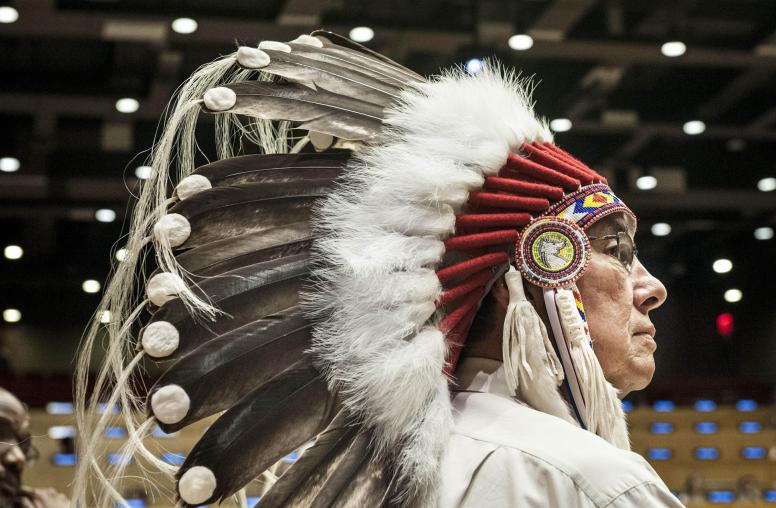A Ripe Moment for Building Peace by Promoting International Religious Freedom
Advocates should form diverse coalitions and lean into religious freedom’s connection to stability and security.
In late June and early July, two global convenings will highlight challenges to international religious freedom and the search for solutions: the IRF Summit for nongovernmental organizations and the International Ministerial Conference on Freedom of Religion or Belief. These timely gatherings will bring together government representatives, activists and faith leaders from different religious, regional and political backgrounds to discuss a common goal of ending persecution. Two keys for their success will be creating diverse coalitions to advance international religious freedom (IRF) in a nonpartisan manner and linking the issue to broader concerns about peace and stability.
![A small crucifix sits on a shelf at prayer meeting in secret amid an uptick in violence against Christians, in a village in the state of Bihar, India. February 12, 2021. (Atul Loke/The New York Times)]](/sites/default/files/styles/image_with_caption/public/2022-06/20220624-india-christians-persecution-12-nyt-ac.jpg?itok=dm43lMCD)
Religious freedom, like other human rights, is strongly correlated with political stability. Conversely, the repression of religion or belief groups often serves as a major driver of conflict and violence. In numerous settings around the world today, discrimination and attacks targeting religious communities are associated with rising social tensions, intercommunal strife, violence and even mass atrocities. Muslims in India, Myanmar and China; Christians in those same countries plus Nigeria and Pakistan; Yazidis in Iraq; Baha’is in Iran; atheists and converts in the Middle East — these groups and others are subject to violence that has far reaching effects on broader prospects for peace and stability.
Consequently, rights-respecting nations and IRF advocates can durably promote peace and stability through the inclusive promotion of individuals’ right to pursue truth as their conscience leads. Put another way, addressing international religious freedom challenges, and doing so for all, must be a vital component of effective peacebuilding.
USIP has worked for decades at the intersection of human rights, religious freedom, peace and stability. For example, a recent USIP project from the religion and inclusive societies team analyzed the link between religious freedom, peace and development.
And last year, the Institute convened the Working Group on International Religious Freedom, which aims to develop strategies for durable religious freedom promotion. As co-chairs, we brought together advocates, academics and former officials from across the political spectrum to discuss the risks of political polarization and how to strengthen nonpartisan approaches to advance religious freedom worldwide. And despite inevitable differences among participants regarding the best approach to religious freedom advocacy, several concrete action points emerged to foster nonpartisan partnerships that promote global peace and stability through international religious freedom:
Religious Freedom Contributes to Stability and Security
For instance, to make the case for why religious freedom matters, advocates should ground and explain IRF in relation to broadly shared, cross-partisan policy priorities connected to advancing peace, stability and national security. Human rights issues — be they focused on religious freedom, freedom of expression or other rights — always face an uphill struggle in the face of other policy priorities. The more IRF advocates can demonstrate how promoting religious freedom contributes to stability and security in post-conflict and peacebuilding settings of strategic significance — for example, in Asia, the Middle East and Africa — the more the issue will be fully considered by policymakers. In this context, promoting religious freedom also represents a particularly ripe and valuable platform for coalescing concerns about China.
Building Alliances with Other At-Risk Communities
With this, IRF advocates should build alliances across different groups also facing persecution. While each circumstance is specific, those persecuted for their religious beliefs, marginalized ethnic minorities, women and victims of discrimination against LGBTQ communities often find themselves experiencing a similar plight and shared threats to their basic human dignity. Fostering bridges between groups subject to different forms of discrimination in conflict and peacebuilding settings can encourage “coalitions of the vulnerable,” bringing greater impact through mutual support where gains for one group can help other victimized communities.
Religious Freedom as a Foundation of Liberal Democracy
Furthermore, it is important to stress how promoting IRF reflects the broad national interests of rights-respecting nations because freedom of conscience undergirds liberal democracies committed to human rights, the rule of law and political pluralism.
Consequently, governments should consider using proactive measures — such as critical statements, multilateral engagements and the possibility of sanctions — to encourage government reforms that strengthen liberal democracy. While not advocating for sanctions per se, consequences are often necessary to bring reform and alleviate persecution. For example, in the United States, the Country of Particular Concern and Special Watch List designations give the State Department the ability to highlight instances of persecution and motivate recalcitrant governments to change abusive policies. The same is true for new Magnitsky laws that target individual persecutors developing in a variety of countries.
But alongside such efforts, there must be community-level action to cultivate mutual respect and pluralism. This simultaneous approach can bring long-lasting results when initiatives foster religious freedom through civil-society-focused programs aimed at cultivating tolerance, mutual respect, pluralism and peace. For instance, by leveraging foreign assistance to emphasize tolerance education for students in grades K-12, the international community can enable partners to address long-term dynamics that promote fear of “the other.”
In conclusion, the oft-quoted Pew Research Center statistics on global restrictions on the practice of faith demonstrate troubling conditions for religious freedom in many contexts worldwide. Millions suffer violent persecution for simply wanting to pursue truth as their conscience leads or for belonging to a particular community, resulting in conflict, instability and human rights abuses. The timing of both the IRF Summit and the International Ministerial, thus, could not be better.
International religious freedom challenges in many parts of the world are often quite literally matters of life and death. To see sustainable progress, rights-respecting nations, organizations and religious communities should work together to meet them.



